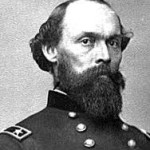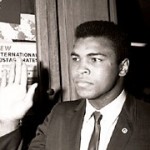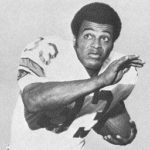The Unheralded Pioneers of 19th-Century America Were Free African-American Families
In her new book, ‘The Bone and Sinew of the Land’, historian Anna-Lisa Cox explores the mostly ignored story of the free black people who first moved West
Photo: The first map of the United States, published in 1784 by Abel Buell, shows the recent addition of the Northwest Territories—a region that would soon include the states of Ohio, Indiana, Illinois, Michigan and Wisconsin, home to thousands of African-American pioneers. (Library of Congress)
(Smithsonian) Before the Louisiana Purchase of 1803, before settlers in wagons organized to travel west along the Oregon Trail in the 1830s, the great American frontier was the prized stretch of land, comprising the states we know today as Ohio, Michigan, Illinois, Indiana and Wisconsin. The colonial rebels claimed control of the region, known as the “Northwest Territory,” upon the end of the American Revolution in 1783. In fact, that territory was one of the reasons for going to war in the first place; British colonists wanted to settle there and turn it to farmland, while George III hoped to leave it for Native Americans and fur trading companies.
When the newly formed United States government opened the territory up for purchase by citizens, ignoring indigenous populations’ right to the land, the Northwest Ordinance of 1787 also stipulated that the region would be free of slavery and that any man who owned at least 50 acres of land, regardless of skin color, could vote. By 1860, the federal census found more than 63,000 African-Americans living in the five states that were founded out of that territory; 73 percent of them lived in rural areas. Those people are the focus in The Bone and Sinew of the Land: America’s Forgotten Black Pioneers and the Struggle for Equality by Harvard historian Anna-Lisa Cox.
“When I started this project, the assumption was that there were three, maybe five settlements where landowning African-American farmers lived in the Midwestern states,” Cox says. “What I began to realize as I studied these settlements and found more and more of them is that it’s these pioneers who had such courage and such imagination about what the nation should be and could be. And it was probably historians, myself included, who were lacking in imagination about this region.” (more)
Historian and UTSA archaeologists discover remains at forgotten African American burial site
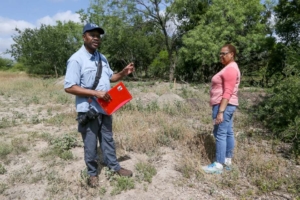 (San Antonio Express-News) Beads of sweat dotted Daniel Winters’ clean-shaven head as he walked across the land that once held the remains of his ancestors in an overgrown corner of Northeast San Antonio.
(San Antonio Express-News) Beads of sweat dotted Daniel Winters’ clean-shaven head as he walked across the land that once held the remains of his ancestors in an overgrown corner of Northeast San Antonio.
He squinted in the glare of the morning sun as his niece Melanie Winters Brooks and landscape architect Everett Fly followed him, seeking to determine the location of long-gone markers.
“My uncle and grandfather were in this area,” the 85-year-old retired electrical technician said, pointing beneath a grove of trees. “Cousin Bessie was over there.”
Wading through knee-high grass and thorn brush, he gestured toward a wooden stake tied with a strip of pink cloth marking what he said was the burial place of his great grandfather, Amos Jackson, a former Buffalo Soldier. Winters hopes to mark other former grave sites in the coming months.
It’s a labor of love mixed with anger and despair.
The marked graves that were once here were summarily moved in 1986, without any notice to family members, and put into a single mass grave at Holy Cross Cemetery, about one mile away. No knows exactly why the remains were removed, but presumably to make way for development that never occurred. (more)
Dallas Will Get First Look At Sally Hemings’ Life At Monticello In Exhibit’s National Tour
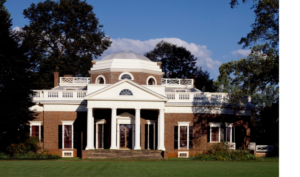
Thomas Jefferson’s home “Monticello” in Charlottesville, Virginia. (Carol Highsmith/Library of Congress)
(KERA News) A landmark exhibition that addresses former President Thomas Jefferson’s long-debated relationship with Sally Hemings, one of his slaves who bore six of his children, will begin its national tour in Dallas this fall.
The exhibition, “Slavery at Jefferson’s Monticello,” was originally organized in 2012 by Jefferson’s estate in partnership with the Smithsonian National Museum of African American History and Culture. Its subject was the wider issue of the daily lives of slaves at the Founding Father’s Virginia plantation.
Thanks to a National Endowment for the Humanities grant, Monticello has expanded that show to include new material about Hemings. During an archaeological excavation of Monticello’s south wing in 2017, thousands of artifacts were uncovered, as well as a kitchen and a bedroom adjacent to Jefferson’s bedroom. That room has since been restored and recently opened as an exhibition dedicated to what little is known of Hemings’ life. (There is, for instance, no known image of her.)
The updated touring version of “Slavery at Jefferson’s Monticello” will feature some 340 items, several of them never seen before. The exhibition will begin its tour at the African American Museum in Fair Park and run from Sept. 22 through Dec. 31. (more)
TIPHC Bookshelf
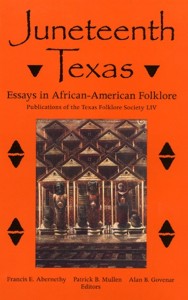 Published scholarship on black history in Texas is growing and we’d like to share with you some suggested readings, both current and past, from some of the preeminent history scholars in Texas and beyond. We invite you to take a look at our bookshelf page – including a featured selection – and check back as the list grows. A different selection will be featured each week. We welcome suggestions and reviews. This week, we offer, “Juneteenth Texas: Essays in African-American Folklore,” edited by Francis Edward Abernethy, Alan B. Govenar, and Patrick B. Mullen.
Published scholarship on black history in Texas is growing and we’d like to share with you some suggested readings, both current and past, from some of the preeminent history scholars in Texas and beyond. We invite you to take a look at our bookshelf page – including a featured selection – and check back as the list grows. A different selection will be featured each week. We welcome suggestions and reviews. This week, we offer, “Juneteenth Texas: Essays in African-American Folklore,” edited by Francis Edward Abernethy, Alan B. Govenar, and Patrick B. Mullen.
“Juneteenth Texas” explores African-American folkways and traditions from both African-American and white perspectives. Included are descriptions and classifications of different aspects of African-American folk culture in Texas; explorations of songs and stories and specific performers such as Lightnin’ Hopkins, Manse Lipscomb, and Bongo Joe; and a section giving resources for the further study of African-Americans in Texas.
This collection, with contributions by Glen Alyn, T. Lindsey Baker, Lorenzo Thomas, Dave Oliphant, Alvia Wardlaw, Patricia Smith Prather and others, contains essays based on personal experiences and reminiscences about the past as well as the present, and studies of particular folklorists who were important in the collecting of African-American folklore in Texas, such as J. Mason Brewer.
This Week in Texas Black History
Jun 18
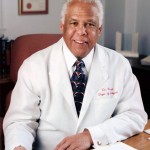 On this day in 2005, renowned surgeon and educator Claude H. Organ, Jr. died in Berkeley, Ca. of heart-related problems at age 78. A Marshall native, Organ was accepted to the University of Texas medical school, but when the school discovered he was black, it offered to pay the difference in tuition for him to attend another school. He graduated from Xavier University a black college in New Orleans and later received a degree from Creighton University School of Medicine in Omaha. Organ developed two successful surgical residency programs, first at Creighton and later at the University of California/Davis-University of California, San Francisco East Bay Surgery Department. During his tenure at San Francisco he served as the first African American editor of the Archives of Surgery, the largest surgical journal in the English-speaking world.
On this day in 2005, renowned surgeon and educator Claude H. Organ, Jr. died in Berkeley, Ca. of heart-related problems at age 78. A Marshall native, Organ was accepted to the University of Texas medical school, but when the school discovered he was black, it offered to pay the difference in tuition for him to attend another school. He graduated from Xavier University a black college in New Orleans and later received a degree from Creighton University School of Medicine in Omaha. Organ developed two successful surgical residency programs, first at Creighton and later at the University of California/Davis-University of California, San Francisco East Bay Surgery Department. During his tenure at San Francisco he served as the first African American editor of the Archives of Surgery, the largest surgical journal in the English-speaking world.
Jun 19
On this day in 1865, Union General Gordon Granger arrived in Galveston and delivered the news about the Emancipation Proclamation, which had originally been issued by President Abraham Lincoln in 1863. Granger, supposedly from a balcony at Ashton Villa, one of the state’s first brick structures, read General Order No. 3, which officially freed 250,000 slaves in Texas. The order read: “The people are informed that in accordance with a Proclamation from the Executive of the United States, all slaves are free. This involves an absolute equality of personal rights and rights of property, between former masters and slaves, and the connection heretofore existing between them, become that between employer and hired labor. The freed are advised to remain at their present homes, and work for wages. They are informed that they will not be allowed to collect at military posts; and that they will not be supported in idleness either there or elsewhere.” In 1979 Governor William P. Clements signed an act making the day a state holiday. The first state-sponsored Juneteenth celebration took place the next year.
Jun 20
On this day in 1967, a jury in federal court in Houston found heavyweight champion Muhammad Ali guilty of draft evasion. Ali, who had a residence in Houston at the time, was known to the government as Cassius Clay and was sentenced to five years in prison and a $10,000 fine. Ali’s contention was that the draft boards in Louisville, Ky., his hometown, and in Houston had acted improperly by not granting him a deferment as a minister in the Nation of Islam, however, he was convicted of violating the U.S. Selective Service laws by refusing to be drafted. He had been ordered to report to a Houston induction station on April 28, 1967 and did, but refused to step forward when his named was called, afterwards saying, ”Man, I ain’t got no quarrel with them Vietcong.” He was immediately stripped of his boxing license and his title and was banned from boxing for three years. He stayed out of prison as his case was appealed. The case reached the U.S. Supreme Court, and on June 28, 1971 (Clay, aka Ali, v. United States) the Court ruled 8-0, with Justice Thurgood Marshall abstaining, that Ali met the three standards for conscientious objector status: that he opposed war in any form, that his beliefs were based on religious teaching and that his objection was sincere. However, Ali had already resumed boxing on October 26, 1970, knocking out Jerry Quarry in Atlanta in the third round.
Jun 21
Dallas Cowboys’ running back Duane Thomas was born on this day in 1947 in Dallas. Thomas had an exceptional career at Lincoln High School, then at West Texas State, where he teamed with another future pro running back, Mercury Morris. Thomas was the Cowboys’ first round pick (23rd overall) in the 1970 draft and was the NFC Rookie of the Year after leading Dallas in rushing (803 yards). He led the league in rushing in 1971 and led the Cowboys with 95 rushing yards and a touchdown in Dallas’ first Super Bowl victory, a 24-3 win over the Miami Dolphins in Super Bowl VI.
Jun 21
On this date in 1955, the El Paso School Board voted to abolish segregation in the city’s public schools becoming the first district in Texas to unconditionally favor desegregation. The move came one year after the U.S. Supreme Court struck down segregation in public schools in the Brown v. Board of Education decision. El Paso board member Ted Andress made the motion: “The School Board members have taken notice of the recent Supreme Court decision on compulsory segregation (which was enforced in Texas). I think it is time that this board makes the prompt and reasonable start toward integration that should be made. I move that we comply with all rulings of the Supreme Court and that segregation on a compulsory or involuntary basis shall not be enforced in the El Paso Public Schools.” The motion took effect with the opening of schools for the 1955 fall semester.
Jun 22
On this date in 1962, basketball great Clyde “The Glide” Drexler was born in New Orleans. Drexler graduated from Sterling High School in Houston then attended the University of Houston where he starred as a member of the teams known as Phi Slama Jama for their fast pace, dunking, high flying style. Drexler was the 14th overall pick of the 1983 NBA Draft by the Portland Trail Blazers and twice led the team to the NBA Finals (1990, 1992). However, he played alongside center and former UH teammate Hakeem Olajuwon on the Houston Rockets 1995 NBA title team. Drexler was a 10-time All-Star, a member of the 1992 U.S. Olympic dream team, and named one of the 50 greatest players in NBA history. He was elected to Naismith Memorial Basketball Hall of Fame in 2004.
Blog: Ron Goodwin, Ph.D., author, PVAMU history professor
Ron Goodwin is an assistant professor of history at Prairie View A&M University. Even though he was a military “brat,” he still considers San Antonio home. Like his father and brother, Ron joined the U.S. Air Force and while enlisted received his undergraduate degree from Texas Lutheran University in Seguin, Texas. After his honorable discharge, he completed graduate degrees from Texas Southern University. Goodwin’s book, Blacks in Houston, is a pictorial history of Houston’s black community. His most recent book, Remembering the Days of Sorrow, examines the institution of slavery in Texas from the perspective of the New Deal’s Slave Narratives.
Recent Posts
King of Kings
During his lifetime Martin Luther King consistently paralleled the experiences of the biblical Children of Israel and the experiences of Africans in America. As a result, he thrust himself into the role of Moses. What I find interesting in these parallels was the ultimate goal of the story. The Children of Israel, after 400 years of bondage, eventually made their way to the Promised Land. This was the message that I believe King was ultimately…
Wakanda Forever — Part 2
The internet records the following regarding the financial success of the Black Panther as of March 25, 2018: Receipts grossed $631.4 million in the US and Canada and a worldwide total of $1.239 billion; The film made $370.5 million worldwide in its opening weekend (the 15th largest of all time); Thus far, Black Panther is the highest-grossing solo superhero film and the 3rd third highest-grossing movie in the Marvel Cinematic Universe (MCU); and In only five weeks after…
Submissions wanted
Historians, scholars, students, lend us your…writings. Help us produce the most comprehensive documentation ever undertaken for the African American experience in Texas. We encourage you to contribute items about people, places, events, issues, politics/legislation, sports, entertainment, religion, etc., as general entries or essays. Our documentation is wide-ranging and diverse, and you may research and write about the subject of your interest or, to start, please consult our list of suggested biographical entries and see submission guidelines. However, all topics must be approved by TIPHC editors before beginning your research/writing.
We welcome your questions or comments. Please contact Mr. Michael Hurd, Director of TIPHC, at mdhurd@pvamu.edu.

